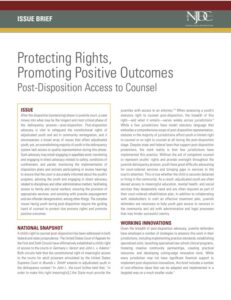Issue Brief-Protecting Rights, Promoting Positive Outcomes: Post-Disposition Access to Counsel
After the disposition (sentencing) phase in juvenile court, a case moves into what may be the longest and most critical phase of the delinquency process—post-disposition. Post-disposition advocacy is vital to safeguard the constitutional rights of adjudicated youth and aid in community reintegration, and it encompasses a broad array of issues that affect adjudicated youth; yet, an overwhelming majority of youth in the delinquency system lack access to quality representation during this phase. Such advocacy may entail engaging in appellate work; monitoring and engaging in direct advocacy related to safety, conditions of confinement, and parole; monitoring the implementation of disposition plans and actively participating in review hearings to ensure that the court is accurately informed about the youth’s progress; advising the youth and engaging in direct advocacy related to disciplinary and other administrative matters; facilitating access to family and social workers; ensuring the provision of appropriate services; and assisting with juvenile expungement and sex offender deregistration; among other things. The complex issues facing youth during post-disposition require the guiding hand of counsel to protect due process rights and promote positive outcomes.

